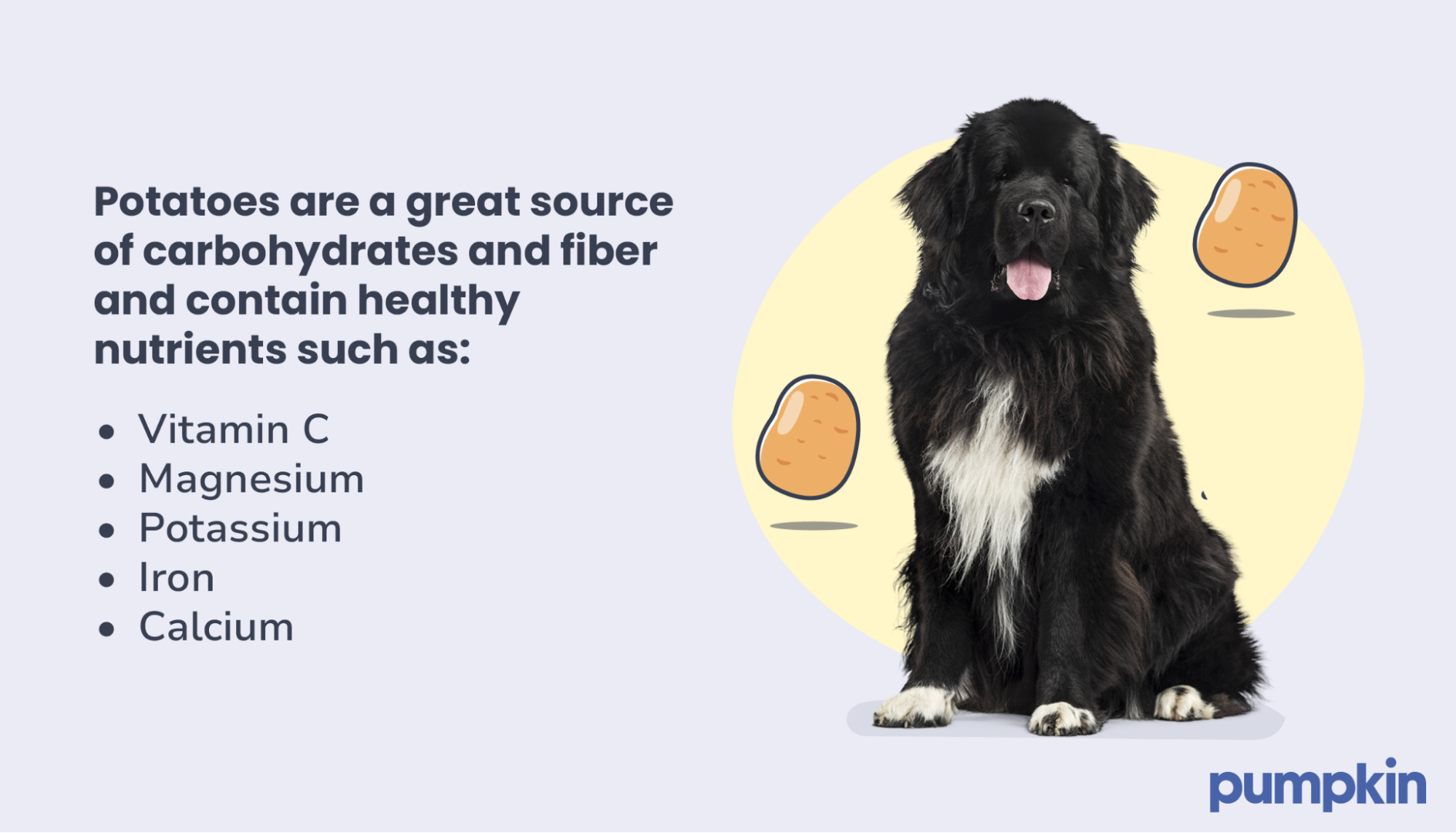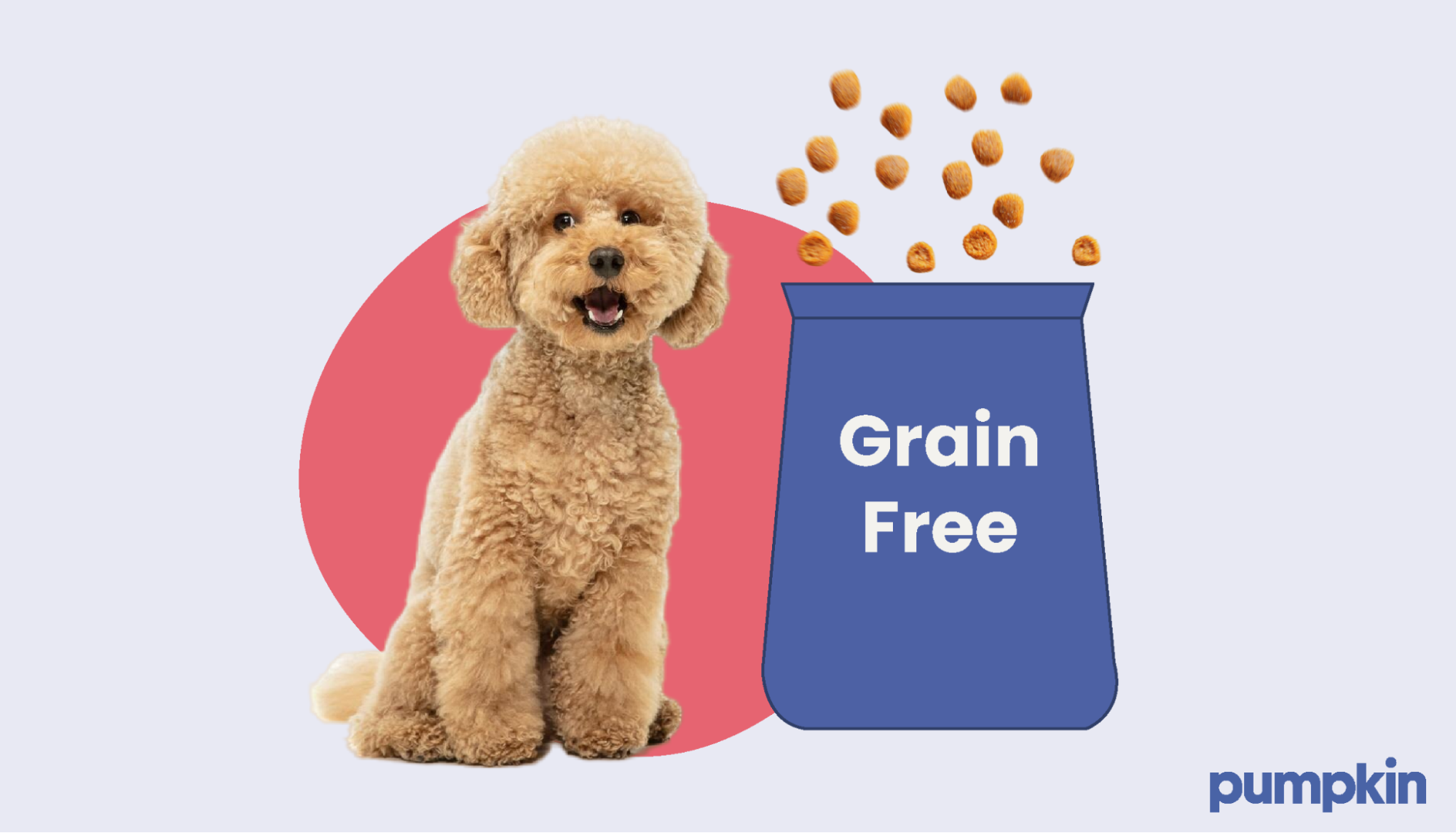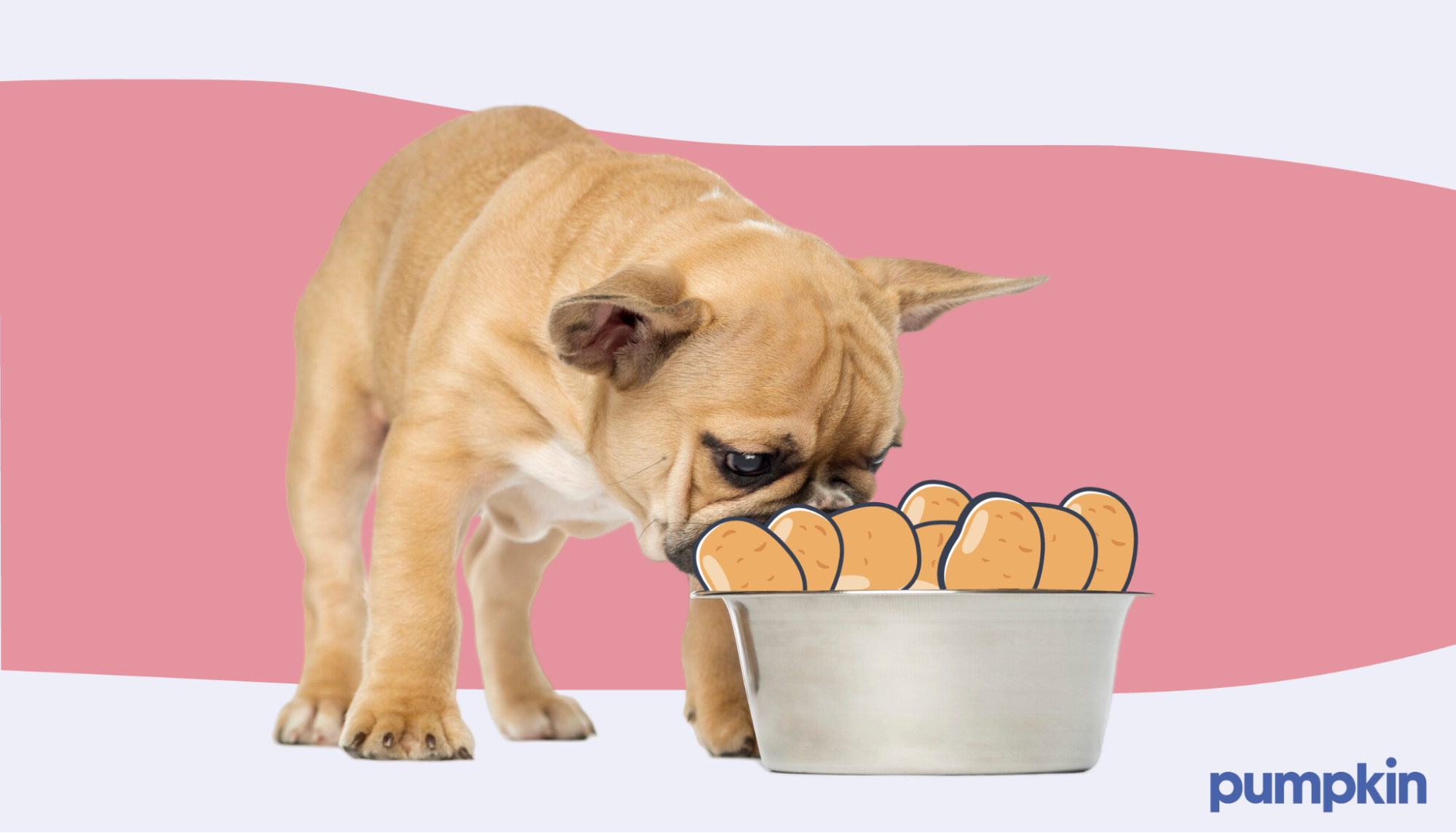Key Points:
- Dogs can eat potatoes, but they must be cooked and served plain.
- Potatoes provide dogs with small amounts of vitamins C and B6, potassium, and magnesium.
- Dogs should avoid raw potatoes and green skin as they contain the toxic compound solanine.
The quintessential comfort food, potatoes are one of America’s most loved veggies. We eat over 120 pounds a year, more than any other vegetable.
They’re a staple on the dinner table, from mashed potatoes with meatloaf to burgers and fries. So it’s only natural that you’d want to share a few spuds with your best bud.
But can dogs eat potatoes safely?
Yes, dogs can eat potatoes as long as they’re plain, cooked, and free of added salt. These versatile root veggies also offer some minor nutritional benefits, making them a healthy snack. But the skin color of your potato and how it’s prepared also matter when feeding your dog.
Read on to learn all about the types of potatoes that are safe for dogs and how they can benefit your pooch.
What types of potatoes are safe for dogs?
Boiled, mashed, or baked potatoes without the skin are the safest types of potatoes for dogs.
They should be cooked well and contain no additional ingredients. That means no added salt, butter, or seasonings. If your dog sneaks some french fries, they should be fine, but don’t intentionally add tater-tots or butter-filled baked potatoes to their dinner bowl.
Nutritional value of potatoes
Potatoes are over 75% water with the remainder being mostly carbohydrates, mainly starch.
In 100 grams of raw, skinless russet potato, there are:
- 83 calories
- 78.6g of water
- 17.8g of carbohydrates (of which 14.9g are fiber and starch)
- 2.27g of protein
Red potatoes and gold potatoes are similar to russet potatoes when it comes to nutritional value. Also, remember that 100 grams may be too much for your pup, espcially if they’re on the small side.
Health benefits of potatoes for dogs
Below are some of the potential health benefits of potatoes for dogs:
- Vitamin C: A powerful antioxidant known to fight free radicals that can destroy cells.
- Potassium: A mineral that keeps your dog’s kidneys functioning well.
- Magnesium: A micro-mineral that supports the metabolization of proteins and fatty acids.
- Iron: An essential nutrient that supports red blood cell formation.
- Calcium: An essential mineral important for building strong bones and teeth.
- Fiber: Essential for keeping the digestive system functioning smoothly, preventing issues like diarrhea and constipation.

How much potato can a dog have?
One tablespoon (10 grams) of plain mashed potato contains about 9 calories (that’s before you load them up with salt and butter). This amount is a safe amount for most dogs, even puppies. Beyond this, here are guidelines for how much potato you can feed your pup based on the recommended daily calories for a healthy adult dog.
- 4 pounds or more: 2 tablespoons
- 7 pounds or more: 3 tablespoons
- 10 pounds or more: 4 tablespoons
- 14 pounds or more: 5 or more tablespoons
When sharing human food with your pup, it’s best to measure out the portion so you know just how much to give them. This will help avoid weight gain and overfeeding.
Risks of feeding potatoes to dogs
Anytime you offer your dog a new food, check with your vet first. While most veggies and fruits are healthy for your pup, some are toxic. Your vet will consider your pup’s unique health needs when recommending human foods that are safe to eat. Spoiler alert: garlic and onions are toxic to our dogs.
Below are some of the health risks of feeding potatoes to your dog.
High glycemic load
Overweight and diabetic dogs should not have potatoes. Potatoes are considered very high on the glycemic index. This is because they’re mostly comprised of carbs, which change into glucose during digestion. That’s why eating too many carbs causes weight gain and raises sugar and insulin levels.
Solanine
Solanine is a toxic compound found in high amounts in the skins, roots, stems, and leaves of the potato plant. It is very toxic to both animals and humans if ingested.
Cooking a potato thoroughly reduces the levels of solanine enough to make it safe to eat. However, this isn’t the case if the potato still has green skin. Green skin occurs when potatoes are not stored correctly and light activates the chlorophyll in the skin, changing its color to green.
Cooking potatoes with green skin will not reduce the solanine levels. This makes potatoes with green skin toxic, and neither humans nor pets should eat them.
Signs of solanine toxicity are:
- Vomiting
- Diarrhea or gastrointestinal upset
- Weakness
- Confusion or lack of coordination
If you suspect your pooch has ingested a raw potato or any part of potato plants, call your veterinarian immediately. The Pet Poison Helpline is also available at 855-764-7661.
If you grow potatoes in your garden, create a dog-proof barrier to eliminate the danger of them consuming the plant material.
Harmful additives
Potatoes prepared with additional ingredients like butter, oil, salt, seasonings, or cheese aren’t good for your pup. Oils, butter, and cheese add too many additional calories. Seasonings can also be harmful, and too much salt can cause salt toxicity in dogs.
These types of processed potatoes are bad for dogs and shouldn’t be shared:
- French fries: fried in oil and covered in salt
- Potato chips: fried in oil and covered in salt or seasonings
- Roasted potatoes: roasted in oil and covered in salt or seasonings
- Scalloped potatoes (au gratin): baked in butter/oil and covered in salt and dairy
- Fried potatoes: fried in oil possibly with onions and garlic (unsafe for dogs)
- Potato salad: often contains seasonings, salt, onions, and dairy
- Potato soup: often contains seasonings, salt, onions, and dairy
If your dog accidentally eats any of these foods, monitor them for digestive issues or signs of an allergic reaction.
Potato allergies
Potato allergies aren’t common, but some pups may react badly to the proteins in potatoes.
When feeding your pet new food, always watch them for symptoms of a food allergy. These include:
- Hives
- Itching
- Upset stomach
- Diarrhea
- Dizziness
- Difficulty breathing
- Swelling
If you notice any of these symptoms in your dog, contact your vet.
The role of potatoes in dog food
Many limited-ingredient and grain-free commercial dog foods use white potatoes as a carbohydrate source because they provide higher digestibility and bioavailable energy than corn. Potato starch increases the expansion of the kibble while reducing its density. It’s also very palatable to dogs, and it’s inexpensive.

How to prepare potatoes for dogs
If you want to give your dog a couple of bites of potato, remove the skin and boil or bake them first.
Mixing a few potato pieces with healthy fruits and veggies can be a healthy, quick snack for your pooch. For example, green beans and broccoli mixed with a couple of small white potato cubes are a healthy, energizing treat for dogs. Or try offering some mashed potatoes mixed with blueberries or strawberries for a hydration boost.
Remember, white potatoes are too starchy for anything other than an occasional snack or small addition to your dog’s diet, and moderation is key when giving your dog human food.
Potato alternatives for dogs
Potatoes offer some minor nutritional benefits to your dog, but there are many healthier options.
Here are some healthy snack alternatives for dogs that are lower in carbs and calories:
Many of these options are lower on the glycemic index, making them safer snacks for overweight or diabetic dogs.
So, can your dog have potatoes?
Yes, your dog can eat plain potatoes if prepared properly and there’s no green color on the potato’s skin. However, the high starch content puts these tubers in the “occasional snack” category. If your dog is diabetic, overweight, or has other health problems, you may want to avoid white potatoes altogether.
When exploring new human foods with your pup, keep a close eye on how they react. As your pup grows up, a dog insurance plan can give you peace of mind in case of unexpected health issues. Pumpkin Dog Insurance can help pet parents get the care their pups need by reimbursing them for a portion of eligible vet bills.
- https://www.farmersalmanac.com/potatoes-the-story-of-americas-favorite-vegetable
- https://fdc.nal.usda.gov/fdc-app.html#/food-details/2346401/nutrients
- https://www.animalmedicalcenterofchicago.com/dog-diet-calorie-requirements-for-dogs/
- https://www.nutritionix.com/food/potato/tbsp
- https://www.healthline.com/nutrition/green-potatoes#high-levels
- https://www.medvet.com/beg-diets-dcm-dogs/
- https://www.sciencedirect.com/science/article/pii/S2405457723001079
- https://www.webmd.com/diet/foods-high-in-oxalates




